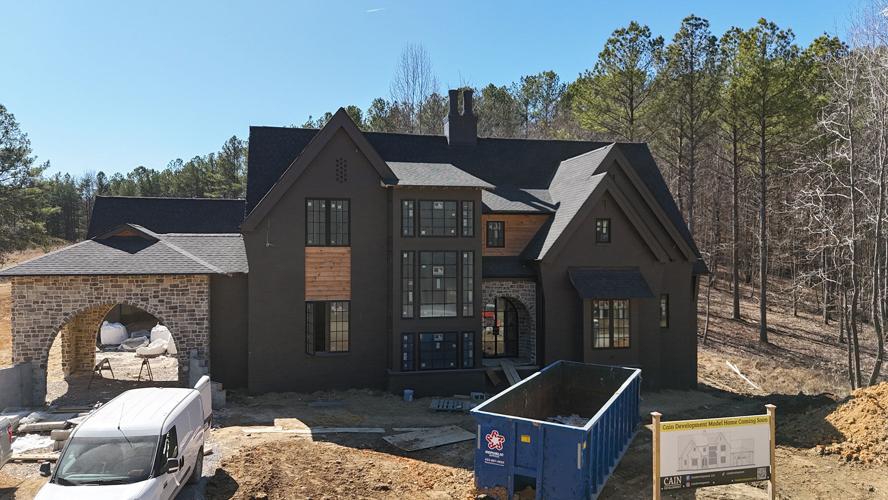In 1989, Marion County High School sponsored an alumni basketball game featuring “Graduates of the Seventies” facing local rivals from South Pittsburg. Marion players photographed for The Jasper Journal, a long-defunct East Tennessee newspaper, included David Jackson (class of ’79), Billy Gouger (’80) and Robert Kelly (’81). Today Jackson is the longtime mayor of Marion County; Gouger is the longtime county attorney; and Kelly works in a local office of Builtwell Bank as a mortgage loan originator.
As reported by the Scene around this time last year, all three sit on the Marion County Planning Commission, which Jackson chairs. There they continue to work as a team — especially when it comes to approving all aspects of River Gorge Ranch (RGR), an ambitious mountaintop development by John “Thunder” Thornton and his company, Thunder Air.
The long-simmering River Gorge Ranch is building slowly in East Tennessee
Gouger’s day job is running the Reliance Title Agency, which sits on the courthouse square. According to the online praise of a local realtor, Gouger is “great [at] closing real estate transactions.” Some of those transactions involve RGR properties, as do some mortgages initiated by Kelly. Among the nine commission members are Louise Powell, owner of Heart Realty, and Gene Hargis, a county commissioner and chief detective of the Marion County Sheriff’s Department (who has done occasional security work at RGR, as he publicly acknowledged at a commission meeting).
RGR sits atop Aetna Mountain (pronounced “Et-Knee” by locals). Many county and planning commission members have older relatives who worked the mines, and some tell stories of long-burning coal fires there. Yet when a local mine enthusiast brought evidence of numerous mines to a county commission meeting last year, Thunder sued him and one other for libel — ultimately losing the case.
Charles Curtiss, executive director of the Tennessee County Commissioners Association, says that under state law, mayors or county executives must be non-voting members of any board or commission they appoint. “So I don’t see how you could be a voting member of the planning commission,” Curtiss (adding that he is “not a lawyer”) says of Jackson.
While there are dozens of examples (some published here previously) of the Marion County Planning Commission not following its own subdivision regulations when it comes to RGR approvals, Curtiss says there is no law requiring the commission to enforce them. He adds that failing to do so could “open the county to future litigation.”
East Tennessee developer behind River Gorge Ranch must pay for costly 'Swiss cheese' suit
One person familiar with the planning commission, who asked not to be identified for fear of retaliation, says Jackson running the show has never been an issue in Marion County. “Mayor Jackson’s two predecessors also served as voting members,” the person says, adding that some exemption may have been allowed by the Tennessee Department of Economic and Community Development. “Often even relatively controversial decisions were made with full agreement of the commission with little debate or discussion, resulting in quick approvals for developers. The attorney would come ready with an opinion to help sway any commissioners that were on the fence.”
Under committee rules, another voting member is always the elected county road superintendent. While the person filling this position may be highly knowledgeable about how to build roads, none have been engineers qualified to inspect roads or roadbeds — yet all were routinely asked to sign off on roads that the planning commission wanted approved. RGR’s winding lanes are private (like those at Jasper Highlands, another Marion County gated community), belonging first to the developer and later to a property owners’ association.
Because these are not public property, no tax dollars can be spent on their inspection. When Cory Pickett, the current road superintendent, inadvertently asked an engineer to perform RGR inspections, the engineer referred him to Brett Howell, executive director of the Tennessee Highway Officials Association. Howell instructed Pickett that the only way he could sign off on the roads would be if the developer hired a licensed engineer to inspect them first. The state’s County Uniform Highway Law “forbids us to do any work or instruct an employee to do any work on a road that is not public,” Howell says. “I’ve seen the billboards on the highway advertising the development as a ‘gated community,’ and that phrase means the roads are private.”

Model home constructed at River Gorge Ranch by Cain Development LLC
According to multiple sources, the mayor and other officials pressured Pickett to continue as his predecessors had, but when he refused, they changed the subdivision regulations: RGR’s engineer will now provide required data. “The roads have to meet the highway standards of our subdivision regulations,” Jackson says.
Local resident Thomas Morgan tried to make public comments about road funding at two county commission meetings last year. In both cases, he was forcibly removed from the building. Morgan later filed a $300,000 civil rights lawsuit over the incidents. He remains so incensed by county practices that he recently purchased the web address “marioncountytn.com” to create a satirical mock-up of the county’s actual website.
A far more reserved form of opposition has come from Commissioner Ruric Brandt, who at several commission meetings introduced suggestions for eliminating conflicts of interest within county government. So far, none of his suggestions has been adopted.
“The county commission has run for many years without those type rules and have always gotten along well and have done well,” Jackson says. “I don’t see any conflict of interest with any of that county commission.”
Brandt, who grew up in the rural Pocono Mountains of Pennsylvania, moved to Marion County after a long career in the military and the tech industry. With population growth in the area — not to mention RGR, where the first residents moved in from Louisiana this month — Brandt was surprised that a motion he introduced to treat newcomers with respect equal to that given to lifetime residents was soundly defeated. Also blocked was discussion of the Special Powers Act, which could have allowed citizens to place restrictions on quarries like the one on Aetna Mountain.
I was not surprised.
I first traveled to Marion County with a college caving club, exploring its many pristine caves and pits. One caver in the club, Sharon, was an elementary school teacher in Florida. After moving to rural Tennessee, she tried to get a similar job. At each interview, the first question was not “What’s your experience,” or “What is your teaching method?” Instead it was, “Who are your people?” With her people down in Florida, the interview was over.
Insular mountain ways die hard, but when rural traditions — especially those involving public employment — remove guardrails from a developer selling to out-of-state buyers, it’s the modern, present-day Tennessee that stands to suffer.
“We got to change with times,” Jackson admits. “People are moving here — not just to Marion County, but to all over the state of Tennessee. We’d like to keep our quality of life that we have here, and I think we will.”









